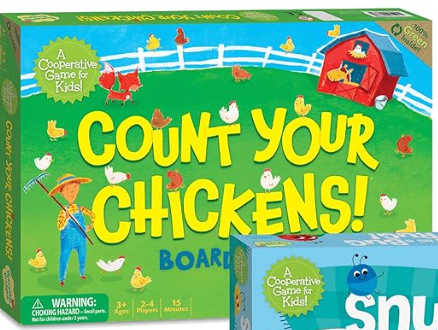Using the Board Game Stone Soup as a Therapeutic Tool for Kids
- Kristin Lovato
- Aug 27, 2024
- 3 min read
In the world of therapy, traditional talk methods often aren't enough to help children express their emotions or learn new skills. That's where play therapy comes in! Games, especially cooperative ones, can offer a safe and engaging space for children to develop emotional regulation, communication, and problem-solving skills. One such game is Stone Soup—a simple, cooperative board game that can be used therapeutically.
What is Stone Soup?
Based on the popular folktale, Stone Soup is a cooperative game where players work together to create a delicious soup by gathering ingredients. The goal is to find the right ingredients before the fire in the pot goes out. There’s no competition in this game—everyone wins or loses as a team. This aspect alone makes Stone Soup a great choice for promoting collaboration and teamwork, both in a family setting and a therapeutic one.
Therapeutic Benefits of Stone Soup
Improving Communication Skills In Stone Soup, players must communicate with one another to gather the right ingredients for the soup. This creates an opportunity for children to practice expressing their ideas and actively listening to others. Encouraging them to talk through their thoughts and plans during the game can help them develop stronger verbal communication skills, which are essential for effective social interactions.
Building Teamwork and Collaboration Since Stone Soup is a cooperative game, it naturally fosters teamwork. Children learn that they need to work together to succeed—there’s no individual winner. This cooperative nature can teach kids the value of collaboration, shared goals, and supporting each other, which are critical components of social development.
Enhancing Emotional Regulation Games can be exciting and sometimes frustrating, making them a perfect platform for practicing emotional regulation. As children navigate the ups and downs of Stone Soup, they may experience feelings like excitement, frustration, or disappointment. This offers a chance to reflect on and discuss these emotions in a safe, controlled environment. For therapists, these moments provide valuable insight into how a child manages their emotions and can serve as a springboard for teaching self-regulation strategies.
Developing Problem-Solving Skills Stone Soup challenges players to think strategically and solve problems together. As they search for ingredients, children will need to make decisions and adapt to changing circumstances. This promotes critical thinking and flexibility, both of which are important skills for handling real-life challenges.
Fostering Creativity The idea of creating a soup from various ingredients can ignite a child’s imagination. Encouraging children to think creatively about the recipes they are making can be a fun way to nurture their creativity. Therapists can build on this by exploring creative themes in the game that relate to a child’s experiences, helping them express themselves in new ways.
Reflection Questions for After the Game
To maximize the therapeutic impact of Stone Soup, reflection is key. After the game, ask questions that help children think about their experience and the skills they used. Here are a few examples:
How did you feel when we had to work together to gather the ingredients?
What was one challenge you faced during the game, and how did you overcome it?
How did it feel when we finally made the soup together? What was your favorite part?
If you could change one rule in the game, what would it be and why?
For therapists and parents, reflecting on these questions can provide insights into a child’s development. Did the child struggle with frustration during the game? Were they able to communicate their ideas effectively? Did they display positive social interactions with others? All of these observations can guide future interventions and support.
How to Incorporate Stone Soup in Therapy
If you’re a therapist, incorporating Stone Soup into sessions can be an excellent way to blend play and therapy. Use it to address a variety of therapeutic goals, such as improving social skills, building emotional regulation, or encouraging teamwork. You can also use the game as a diagnostic tool—observing how children handle challenges and interact with others during the game can give you valuable insight into their emotional and social development.
For parents and educators, Stone Soup is a wonderful game to incorporate into family game nights or classroom activities. It creates opportunities for learning in a fun and engaging way, all while promoting positive social behaviors.
Stone Soup is more than just a fun board game—it's a powerful therapeutic tool that can help children build essential skills for emotional regulation, communication, and collaboration. Whether you’re a therapist, parent, or teacher, this cooperative game can offer valuable lessons while keeping kids engaged and entertained.

Have you tried using Stone Soup or other games therapeutically? Let us know in the comments! 🎲🍲
Try it out here: https://amzn.to/3MmntsL
Want to watch a TikTok on the game? Click here: https://www.tiktok.com/@inspiredhealthfit/video/7408013044514671914?lang=en



Comments